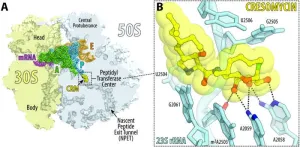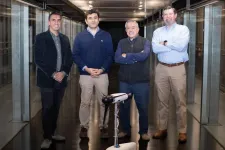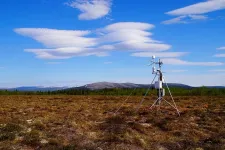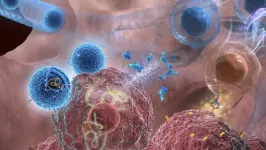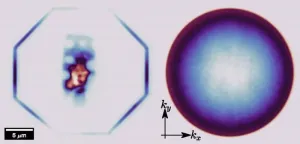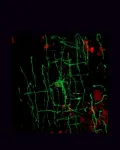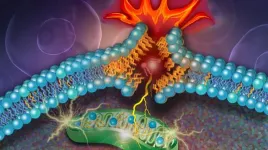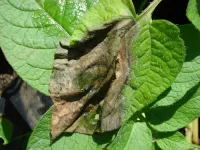Superbug killer: New synthetic molecule highly effective against drug-resistant bacteria
2024-02-15
A new antibiotic created by Harvard researchers overcomes antimicrobial resistance mechanisms that have rendered many modern drugs ineffective and are driving a global public health crisis.
A team led by Andrew Myers, Amory Houghton Professor of Chemistry and Chemical Biology, reports in Science that their synthetic compound, cresomycin, kills many strains of drug-resistant bacteria, including Staphylococcus aureus and Pseudomonas aeruginosa.
“While we don’t yet know whether cresomycin and drugs like it are safe ...
With just a little electricity, MIT researchers boost common catalytic reactions
2024-02-15
CAMBRIDGE, MA — A simple technique that uses small amounts of energy could boost the efficiency of some key chemical processing reactions, by up to a factor of 100,000, MIT researchers report. These reactions are at the heart of petrochemical processing, pharmaceutical manufacturing, and many other industrial chemical processes.
The surprising findings are reported today in the journal Science, in a paper by MIT graduate student Karl Westendorff, professors Yogesh Surendranath and Yuriy Roman-Leshkov, and two others.
“The results are really striking,” says Surendranath, a professor of chemistry ...
Keeping telomerase in check
2024-02-15
The natural ends of chromosomes appear alarmingly like broken DNA, much as a snapped spaghetti strand is difficult to distinguish from its intact counterparts. Yet every cell in our bodies must have a way of differentiating between the two because the best way to protect the healthy end of a chromosome also happens to be the worst way to repair damaged DNA.
Consider the enzyme telomerase, which is responsible for maintaining protective telomeres at the natural ends of chromosomes. Were telomerase to seal off a broken strand of DNA with a telomere, it would prevent further repair of that break and delete essential genes. Now, a new study in Science describes how cells avoid ...
Competition for food drives the planet’s remaining mass migration of herbivores
2024-02-15
Upending the prevailing theory of how and why multi-species mass-migration patterns occur in Serengeti National Park, researchers from Wake Forest University have confirmed that the millions-strong wildebeest population pushes zebra herds along in competition for the most nutrient-dense grasses.
The study resulting from this research, “Interplay of competition and facilitation in grazing succession by migrant Serengeti herbivores,” appears today in the peer-reviewed journal Science.
For decades, biologists have believed the major grazing ...
UT Dallas Wind Energy Center to expand with new headquarters, resources
2024-02-15
The University of Texas at Dallas’ wind energy research programs have expanded rapidly in recent years, with labs, offices and facilities spread out on campus. In 2020 UT Dallas formed the Wind Energy Center, called UTD Wind, to bring its wind energy programs under one virtual umbrella.
Now, a new initiative will give UTD Wind a physical headquarters for the first time with additional labs, meeting areas and office space. The project also includes additional equipment for wind energy research and education.
UT Dallas has received $1.6 million through the federal Consolidated Appropriations Act to support the expansion, which will bring most of the center’s ...
More Aston University scholarships to encourage graduates from under-represented groups to work in artificial intelligence
2024-02-15
• Eleven scholarships worth £10k each for MSc Applied AI
• They are funded by the Office for Students (OfS)
• Aimed at graduates without a science, tech, engineering or maths degree.
Aston University is offering more opportunities to graduates who want a career in artificial intelligence (AI) but don’t have a science, technology, engineering or maths degree.
The scholarships are offered due to increased funding from the Office for Students (OfS). Each award is worth £10,000 and will be awarded to students enrolling ...
How is deforested land in Africa used?
2024-02-15
Africa's forested areas – an estimated 14 % of the global forest area – are continuing to decline at an increasing rate – mostly because of human activities to convert forest land for economic purposes. As natural forests are important CO2 and biodiversity reservoirs, this development has a significant impact on climate change and effects the integrity of nature. To intervene in a targeted manner in the interests of climate protection and biodiversity, there has been a lack of sufficiently good data and detailed knowledge ...
Studies with more diverse teams of authors get more citations
2024-02-15
Diverse research is more impactful in the business management field, with female influence growing stronger in the past decade, finds a new study from the University of Surrey.
The study analysed all articles published in the last 10 years (January 2012 to December 2022) in the influential Journal of Management Studies.
The empirical analysis examined three key aspects of teams’ diversity:
Internationality (how international is mix of authors),
Interdisciplinarity (how many different fields of study they come from),
Gender ...
UC Irvine researcher co-authors ‘scientists’ warning’ on climate and technology
2024-02-15
Irvine, Calif., Feb. 15, 2024 – Throughout human history, technologies have been used to make peoples’ lives richer and more comfortable, but they have also contributed to a global crisis threatening Earth’s climate, ecosystems and even our own survival. Researchers at the University of California, Irvine, the University of Kansas and Oregon State University have suggested that industrial civilization’s best way forward may entail embracing further technological advancements but doing so with greater awareness of their potential drawbacks.
In a paper titled “Scientists’ Warning on Technology,” published recently in the Journal of Cleaner ...
Methane emissions from wetlands increase significantly over high latitudes
2024-02-15
– By Julie Bobyock
Wetlands are Earth’s largest natural source of methane, a potent greenhouse gas that is about 30 times more powerful than carbon dioxide at warming the atmosphere. A research team from the Department of Energy’s Lawrence Berkeley National Laboratory (Berkeley Lab) analyzed wetland methane emissions data across the entire Boreal-Arctic region and found that these emissions have increased approximately nine percent since 2002.
Livestock and fossil fuel production are well studied for their role in releasing tons of methane per year into the atmosphere. Although more uncertain, quantifying natural wetlands emissions is important to predicting climate ...
Study finds new inhalable therapy is a big step forward in lung cancer research
2024-02-15
Lung cancer is one of the most common cancers and has one of the lowest survival rates in the world. Cytokines, which are small signaling proteins, such as interleukin-12 (IL-12), have demonstrated considerable potential as robust tumor suppressors. However, their applications are limited due to a multitude of severe side effects.
In a paper published Jan. 11 by Nature Nanotechnology, Biomedical Engineering Professor Ke Cheng and his research group demonstrate that using nanobubbles, ...
Damon Runyon Cancer Research Foundation awards $3.2 million to innovative early-career scientists
2024-02-15
The Damon Runyon Cancer Research Foundation has announced eight recipients of the 2024 Damon Runyon-Rachleff Innovation Award, established to support “high-risk, high-reward” ideas with the potential to significantly impact the prevention, diagnosis, or treatment of cancer. Five extraordinary early-career researchers will receive initial grants of $400,000 over two years, and each will have the opportunity to receive two additional years of funding (for a potential total of $800,000). This year, this “Stage 2” continuation ...
Scientific report reveals livestock as the key factor in cheatgrass spread
2024-02-15
For Immediate Release
Contact: Erik Molvar, Western Watersheds Project, 307-399-7910
Roger Rosentreter, Bureau of Land Management, Botanist (Retired), 208-991-8815
Don Mansfield, Emeritus Professor of Biology, College of Idaho, 208-871-8170
Scientific Report Reveals Livestock Grazing as the Key Factor in Cheatgrass Spread
HAILEY, Ida. (February 15, 2024) – A scientific report released today illuminates the causes of cheatgrass spread and compares the effectiveness ...
NRL discovers two-dimensional waveguides
2024-02-15
WASHINGTON – The U.S. Naval Research Laboratory (NRL), in collaboration with Kansas State University, announce the discovery of slab waveguides based on the two-dimensional material hexagonal boron nitride. This milestone has been reported in the journal Advanced Materials.
Two-dimensional (2D) materials are a class of materials which can be reduced to the monolayer limit by mechanically peeling the layers apart. The weak interlayer attractions, or van der Waals attraction, allows the layers to be separated via the so-called ...
AIBS names 2024 emerging public policy leaders
2024-02-15
The American Institute of Biological Sciences (AIBS) is pleased to announce that Alex Rich and Efraín Rodríguez-Ocasio have been selected to receive the 2024 AIBS Emerging Public Policy Leadership Award (EPPLA). The award recognizes graduate students in the biological sciences who have demonstrated leadership skills and an aptitude for working at the intersection of science and public policy.
Alex Rich is a Ph.D. student in neuroscience at Yale University in New Haven, Connecticut. Her research focuses on decision-making and disordered ...
Shuffling the deck for privacy
2024-02-15
By integrating an ensemble of privacy-preserving algorithms, a KAUST research team has developed a machine-learning approach that addresses a significant challenge in medical research: How to use the power of artificial intelligence (AI) to accelerate discovery from genomic data while protecting the privacy of individuals.[1]
“Omics data usually contains a lot of private information, such as gene expression and cell composition, which could often be related to a person’s disease or health status,” says KAUST’s Xin Gao. “AI models trained on this data – particularly deep learning models – have the potential to retain private ...
Root microbes may be the secret to a better tasting cup of tea
2024-02-15
You’d think the complex flavor in a quality cup of tea would depend mainly on the tea varieties used to make it. But a study appearing in the journal Current Biology on February 15 shows that the making of a delicious cup of tea depends on another key ingredient: the collection of microbes found on tea roots. By altering that assemblage, the authors showed that they could make good-quality tea even better.
“Significant disparities in microbial communities, particularly nitrogen metabolism-related microorganisms, were identified in the roots of tea plants with varying qualities through ...
Winners of 4th annual Rising Black Scientists Awards announced
2024-02-15
Cell Press, Cell Signaling Technology (CST), and the Elsevier Foundation are proud to announce the winners of the 4th annual Rising Black Scientists Awards: Jaye Wilson of Yale University, Kevin Brown Jr. of California State University San Marcos, Senegal Mabry of Cornell University, and Akorfa Dagadu of the Massachusetts Institute of Technology.
This year had the greatest number of submissions thus far, with the winners being selected from a pool of more than 350 applicants from across the life, health, physical, earth, environmental, and data sciences. Essays from the winners and honorees appear in the journals Cell and ...
Ancient retroviruses played a key role in the evolution of vertebrate brains
2024-02-15
Researchers report February 15 in the journal Cell that ancient viruses may be to thank for myelin—and, by extension, our large, complex brains. The team found that a retrovirus-derived genetic element or “retrotransposon” is essential for myelin production in mammals, amphibians, and fish. The gene sequence, which they dubbed “RetroMyelin,” is likely a result of ancient viral infection, and comparisons of RetroMyelin in mammals, amphibians, and fish suggest that retroviral infection and genome-invasion ...
Researchers discover that a rare fat molecule helps drive cell death
2024-02-15
Columbia researchers have found that a rare type of lipid is a key driver of ferroptosis, a form of cell death discovered by Columbia professor Brent Stockwell.
The findings provide new detail on how cells die during ferroptosis and could improve understanding of how to stop ferroptosis in contexts where it is harmfully occurring– in neurodegenerative diseases, for example– or induce it in contexts where it could be useful, such as using it to kill dangerous cancer cells.
The new research found that a rare type of ...
Plant disease: Mapping the spread of potato blight prior to the Irish potato famine *IMAGES*
2024-02-15
The first accurate maps of outbreaks of potato blight — a disease caused by the fungus-like pathogen Phytophthora infestans that was responsible for the Irish potato famine between 1845 and 1852 — in the USA between 1843 and 1845 are presented in a study published in Scientific Reports. The findings improve our understanding of the spread of potato blight before the disease reached Europe.
Jean Ristaino and colleagues mapped outbreaks of potato blight in North America between 1843 and 1845 by analysing historic agricultural reports published in the USA during this period. The authors found that the disease was first reported ...
New treatment for a rare and aggressive cancer improves survival rates in breakthrough clinical trial
2024-02-15
An innovative treatment significantly increases the survival of people with malignant mesothelioma, a rare but rapidly fatal type of cancer with few effective treatment options, according to results from a clinical trial led by Queen Mary University of London.
The phase 3 clinical trial, led by Professor Peter Szlosarek at Queen Mary and sponsored by Polaris Pharmaceuticals, has unveiled a breakthrough in the treatment of malignant pleural mesothelioma (MPM), a rare and often rapidly fatal form ...
Weight loss treatment and longitudinal weight change among patients with obesity
2024-02-15
About The Study: In this study of primary-care patients with obesity, all weight management treatments (nutrition counseling, very low-calorie meal replacement, anti-obesity medications, and bariatric surgery) increased the patient-level probability of achieving 5% or greater weight loss, but current rates of utilization are low and insufficient to reduce weight at the population level.
Authors: Dina H. Griauzde, M.D., M.Sc., of the University of Michigan in Ann Arbor, is the corresponding author.
To access the embargoed study: Visit our For The Media website at this link https://media.jamanetwork.com/
(doi:10.1001/jamanetworkopen.2023.56183)
Editor’s ...
Traumatic brain injury and subsequent risk of brain cancer in US veterans of the Iraq and Afghanistan wars
2024-02-15
About The Study: Moderate or severe and penetrating traumatic brain injury (TBI) were associated with the subsequent development of brain cancer in this study of more than 1.9 million veterans of the Iraq and Afghanistan wars. However, mild TBI was not associated with later brain cancer diagnoses.
Authors: Ian J. Stewart, M.D., of the Uniformed Services University of Health Sciences in Bethesda, Maryland, is the corresponding author.
To access the embargoed study: Visit our For The Media website at this link https://media.jamanetwork.com/
(doi:10.1001/jamanetworkopen.2023.54588)
Editor’s ...
Using written records – and tweets – as a roadmap for plant disease spread
2024-02-15
North Carolina State University researchers used text analytics on both historic and modern writing to reveal more information about the effects and spread of the plant pathogen – now known as Phytophthora infestans – that caused the 1840s Irish potato famine and that continues to vex breeders of potatoes and tomatoes.
The study examined keyword terms like “potato rot” and “potato disease” after digitizing historic farm reports, news accounts and U.S. Patent Office agricultural records from 1843 ...
[1] ... [1363]
[1364]
[1365]
[1366]
[1367]
[1368]
[1369]
[1370]
1371
[1372]
[1373]
[1374]
[1375]
[1376]
[1377]
[1378]
[1379]
... [8818]
Press-News.org - Free Press Release Distribution service.
